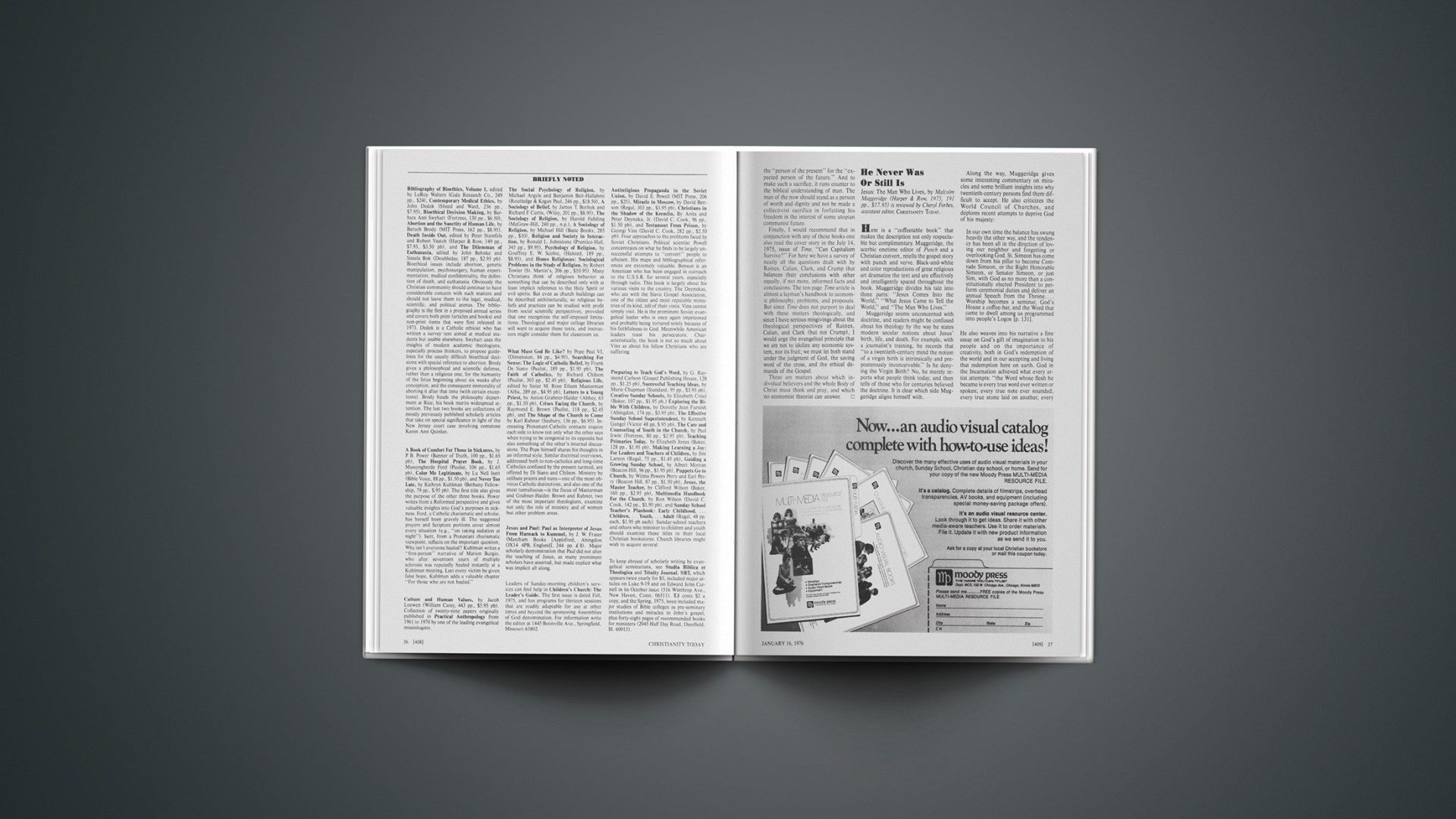Under the general title “Evangelicals in Search of Identity,” Dr. Henry begins in this issue a monthly series of “Footnotes” devoted to the strengths and weaknesses of evangelical Christianity on the present American scene. His observations are written in the mood of his book “The Uneasy Conscience of Modern Fundamentalism,” which appeared shortly before mid-century.—ED.
Twenty-five years ago there were signs that a long-caged lion would break its bars and roar upon the American scene with unsuspected power. The mounting vitality of the evangelical movement baffled the secular press, a press beguiled by ecumenical spokesmen for liberal pluralism to regard conservative Christianity as a fossel-cult destined to early extinction.
While modernist disbelief and neo-orthodox universalism scotched the indispensability of conversion, the Graham evangelistic crusades demonstrated anew the Gospel’s regenerating power. Fuller Theological Seminary in 1947 brought a higher dimension to most evangelical divinity learning. The Evangelical Theological Society at mid-century canopied hundreds of scholars committed to scriptural inerrancy and hoped to shape a theological renaissance. Evangelical books of philosophical and theological power were on the increase—G. C. Berkouwer, J. Oliver Buswell, Gordon Clark, Cornelius Van Til, E. J. Carnell, Bernard Ramm, and others paced the way as J. Gresham Machen had done a half-century earlier—and vigorous symposium and commentary series appeared. The National Association of Evangelicals, founded in 1942, rallied a service constituency of ten million American evangelicals. CHRISTIANITY TODAY united scattered evangelical contributors from all denominations in a common theological, evangelistic, and social witness. Garnering an impressive paid circulation of 175,000, the magazine enlisted the loyalties of many who were disenchanted with both the fundamentalist far-right and the liberal left; scholars like D. Elton Trueblood now aggressively championed evangelical rational theism.
Aiming to penetrate the secular intellectual arena with young educators holding an informed Christian life and world view, leaders met and talked of a Christian university. Their vision, attenuated through many delays, issued finally in a mobile fellowship of scholars, the Institute for Advanced Christian Studies. Meanwhile the Consortium of Christian Colleges emerged to link evangelical campuses in new cooperative effort.
In a time when ecumenical missionary enthusiasm was beginning to wane, the five missionaries martyred by Auca Indians underscored evangelical Christianity’s frontier evangelistic concern. Evangelistically committed churches were expanding; some “third force” churches registered post-war growth rates exceeding 500 per cent. The World Congress on Evangelism, sponsored in 1966 by CHRISTIANITY TODAY, gathered evangelists from all continents for an accelerated world thrust.
Church historian Sydney Ahlstrom writes of this “rapidly growing force in American Christianity” in terms of a “vast, inchoate multitude of earnest Christians and a much more dynamic and exclusivistic ‘third force’ ” (A Religious History of the American People).
While still on the loose, and still sounding his roar, the evangelical lion is nonetheless slowly succumbing to an identity-crisis. The noteworthy cohesion that American evangelicals gained in the sixties has been fading in the seventies through multiplied internal disagreements and emerging counter-forces.
The world fundamentalist conference scheduled to be held this June in Edinburgh indicates that despite the weakened influence of Carl McIntire, the evangelical far-right is regathering for a massive initiative all its own.
In its post-Lausanne-Congress (1974) para-ecumenical thrust, the World Evangelical Fellowship waivers between those who want the emphasis solely on cooperative evangelism and those who insist that the Gospel’s social implications are not optional. The so-called American evangelical establishment—represented prominently by the National Association of Evangelicals (its impact curtailed by strategy and money limitations), the Billy Graham Evangelistic Association, many evangelical college and seminary administrators, and more recently also by Campus Crusade for Christ—so elevates personal evangelism above other concerns that the Christian faith’s sociocultural interests hold seemingly marginal focus.
That courageous minority of evangelical clergy in the National Council of Churches orbit who mine the intellectual and social as well as evangelistic facets of the heritage have witnessed the withering of conciliar ecumenism because of its ill-advised pluralistic and political priorities; they find no wholly congenial home in the National Association of Evangelicals, however, and probe other evangelical fellowships (Reformed, sub-denominational, regional, and the like). Restive participants within all these groups are calling for vigorous alternatives and voice increasingly strident criticism of the evangelical status quo.
The latest in a rather long succession of volumes about the conservative religious scene is The Evangelicals, edited by David F. Wells and John D. Woodbridge (see CHRISTIANITY TODAY, December 19, 1975, pp. 18–21). Its diversity of contributors—some evangelical and some nonevangelical—leaves unclear just what authentic evangelical Christianity is. Does Paul Holmer or Martin Marty or John Gerstner or Kenneth Kantzer speak definitively?
A great deal has evidently happened since The Uneasy Conscience of Modern Fundamentalism (Eerdmans, 1947), when, despite a growing conviction that the evangelicals needed to mend some of their ways, there was little doubt as to who they are.
The evangelical high noon of a half-generation ago was not in fact without significant historical antecedents, however much liberal church historians tend to minimize them. To assess the crumbling of evangelical unit we shall need to consider emphases by certain evangelicals earlier in this century and those by some in the present. Having burst his cage in a time of theological default, the lion of evangelicalism now seems unsure which road to take.
CARL F. H. HENRY










